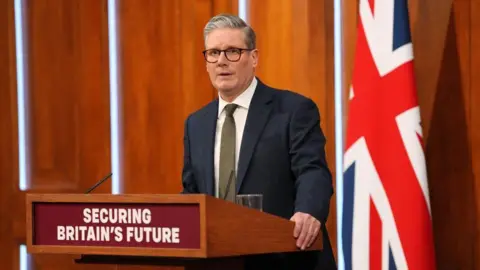Political reporter
Job representative
 Reuters
ReutersParliament will be called back to pass an emergency law on a rare Saturday that aims to prevent the British Steel’s Scantorp plant from closing closely.
Sir Kerr Star said the law would allow ministers to “control” the Lincolnshire site and to stop its Chinese owner from closing the explosion kilns.
The move opens the door to the company’s full national करण in the later phase, the Prime Minister said that the “all options” are on the table.
The owners said that after the blast furnace was “no longer financially sustainable”, there was talks to continue production this week.
MPs and we are currently at their Easter break and they were not going to return until April 22, but now the two will return to the Westminster to sit quickly.
This will be the fifth time after World War II, when the parliament was sitting on Saturday, which shows that the government is important to the law.
Sir Kerr said the government wants to legislate in a single day, which includes the company’s future “hanging in balance”.
“Steel making is” necessary for our future “and they will always” work in the national interest to protect British jobs and British workers, “he said.
The Prime Minister said, “Jobs, investment, growth, our economic and national security are in the sub -line.”
The BBC believes from a senior government source that voting for emergency legislation in Parliament on Saturday will not give ministers the power to nationalize British steel, it will require another bill.
The Chinese company Jengie, who bought British Steel in 2020, says it has invested more than $ 1.2 billion in the company to maintain work, but is facing a financial loss of about $ 700,000 a day.
The department said that the new law would provide government powers to order raw materials so that the site’s two moving blast furnaces could continue, and in the coming weeks, the supply of goods would be delivered.
He added that it would also allow ministers to direct the company’s board and manpower, and will ensure that “which takes steps to operate” against Chinese ownership orders “can be restored if they are dismissed.
‘Foundation Industry’
The company last month announced plans to get jobs at the Scotterp site, which hires 2,700 people, accusing the cost of “extremely challenging” market conditions, prices and low carbon production techniques.
The government has offered $ 500 million support to partially fund a switch in more energy -efficient electric arc furnaces than blast furnaces. But the company has rejected the offer.
Earlier this week, the government Offered to buy coking coal Plant to continue the blast furnace until long -term solutions to save the plant, but it failed to persuade the company in tense talks.
It is thought that the business secretary has lost confidence in the company’s Chinese owners, with an official source saying that he is no longer a reliable partner “.
Unions representing employees on the site have welcomed the company to control the company, saying that it will provide “recovery” to workers while a long -term solution is done.
General Secretary Sharon Graham added, “Ministers could not allow any foundation industry to go down.”
The GMB Union said the government’s move looks like a “first step” towards national, supporting the “only way to save the UK’s steel industry”.
The Steel Workers Union Community said the government could not allow the UK to become the only country in the G7 group of modern economies “without the capacity of basic steel making.
‘Plaster sticking’
Conservative leader Cam Badnovich accused the government of “quarreling” talks with British Steel.
“They may have seen this for a while,” he added.
“Instead of addressing it earlier in the week, when Parliament was sitting, his disqualification has led to the memory of the last minute of parliament.”
The government’s plan was just a “short -term sticky plaster,” said British leader Nigel Fariz.
He added that his party will try to amend the emergency legislation to immediately shape British steel, and public ownership “is the only option to save us this important strategic asset”.
The Liberal Democrat Leader Sir Aid Davey said that “nothing should happen in this case of national security” and added that the memory of Parliament should be seen as a “opportunity to come forward with a sustainable future plan for domestic steel production”.
The Green Party of England and Wales said it supported nationalization as a “only way to secure the important sector in terms of this strategy”.
Parliament was last withdrawn from a schedule in August 2021 to discuss the return of the United States from Afghanistan.
The attack on Fakland Island in 1982 and the Brexit Agreement in 2019 are two other opportunities that have memories.
The most recent week of the Saturday was September 10, 2022, when the House of Lords resumed late Queen Elizabeth II to pay tribute.
The House of Commons has been withdrawn 34 times from 1948.



